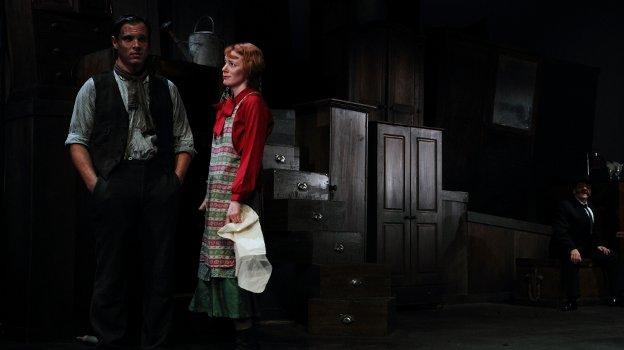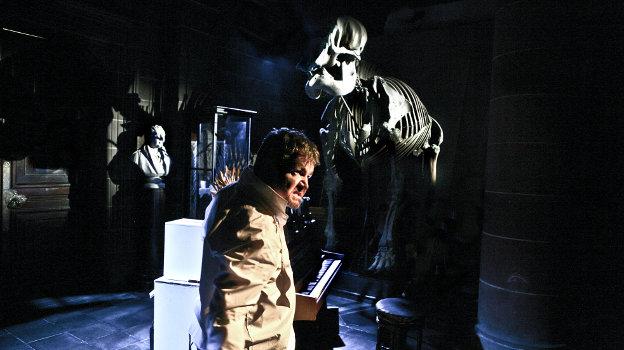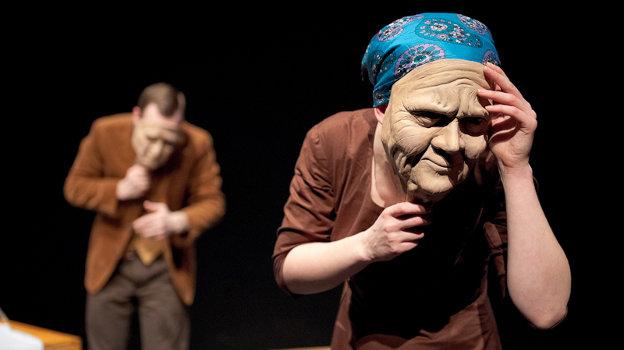Meet Gwyn Thomas, who is dead. He won’t lie down but he does occasionally slump on a sofa clutching the urn that holds his ashes, and often he’s to be found perched on a staircase, listening in on his father and his younger self, or eavesdropping on his neighbours. ‘Tell him to…’ he says, planting ideas in people’s heads. And who are these people he manipulates like puppets? Why, the people of the Rhondda Valley, of course, where Gwyn was born and bred, and the place that is the setting for his novels, short stories, plays, and autobiographical writings. Before seeing The Dark Philosophers, I knew nothing about the life and work of this renowned Welsh writer, but now he feels like a friend.
So here we are in the Valley, sometime in the 1930s, a place where people live ‘operatically, in shouts’. The crowded Terraces are represented by a clutter of junk-shop furniture – closets and wardrobes and chests. Wardrobe doors burst open and out come the villagers. An ensemble of seven (four men and three women) play around 30 colourful characters – and that’s not including Michael Parkinson, the goats, and the Oxford University students. They are as sharp and sparky an ensemble as you are likely to find anywhere, drawing us from one terrible – and often terribly funny – tale to another with breakneck speed and razor-sharp observation.
Told By An Idiot are masters of physical and visual modes of storytelling, and Paul Hunter’s direction brings out the best of everyone (and everything) on stage. A wardrobe door pops open, and we’re instantly in a Valley pub, witnessing a game of darts. Two people crawl painfully slowly across the floor in almost-darkness and we’re on the coal face too. A watering can is emptied over a man tugging his raincoat up to his ears, and we’re caught in the downpour with him. A broom, a jacket, and a wig are pulled together and there, looming over us menacingly, is Oscar the mountain-owner, the embodiment of capitalist greed, a tyrant who is willing to kill a poor man scavenging for coal just for the hell of it.
Some of the stories get pretty hairy: the coal-scavenging murderous-capitalist story is nasty in all sorts of ways; and one about a goat-keeper whose daughters take desperate measures to save their youngest sister from the abuse that they’ve experienced is horrible, yet told with a terrible black humour: ‘Could you love a goat?’ the goat-keeper asks the young lad who has come to work for him…
Every element of the production is beautifully realised: the characterisations (flirty barmaids, tired miners, and a shy lad ‘so thin he’s liable to fall through the cracks in the pavement’); the feisty physical action (a rip-roaring Commedia-style fight scene, a kitchen-table murder, a dodgy cabaret singer’s worst moment, seen through the eyes of her audience of male admirers); the sound (great booming crashes from the pits, gently tinkling pianos, and the odd tune on a ukelele); the design, which conjures up a sepia-tinged, earthy world – the nutty wood brown ‘architecture’ lit with street-lamp ambers. The text, crafted by Carl Grose, is both poetic and cheerily colloquial: ‘You could boil a bloody egg to those blasts, eh… Every three minutes, aren’t they?’
All this and scene-shifting too! As two actors who’ve been playing goats stop their bleating and leap up to move a large table aside, our Gwyn chimes in with: ‘You don’t see that every day, do you? Goats moving furniture’. You don’t indeed. But I’m very glad I did.










